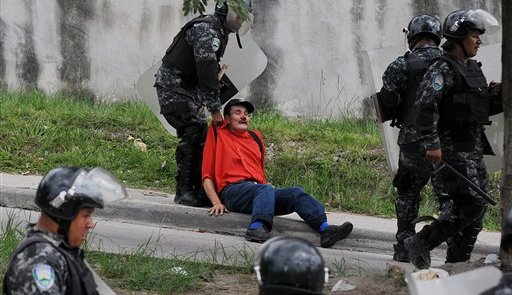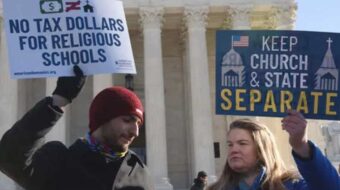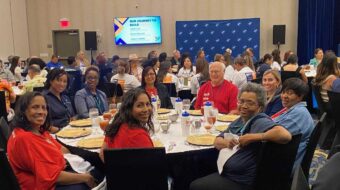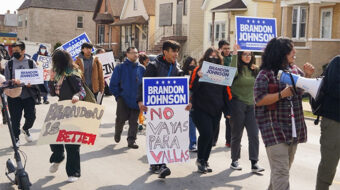
Some fallout from the 2009 military coup removing Honduran President Manuel “Mel” Zelaya becomes evident only over time. Land takeovers for industrial farming are on a fast track with harmful effects accumulating. And plans are unfolding for manufacturing and trade enclaves under privatized governance.
A 2010 Supreme Judicial Court decision invalidated a 2009 decree issued by the Zelaya government that authorized small farmers to use 150,000 acres of land subject to land reform instituted decades before. They quickly occupied half the land. Now landowners in the fertile Lower Aguan region are using soldiers and paramilitaries to evict them. Land there is coveted for growing African Palm trees, the oil of which is used for biofuel.
The recently formed Regional Agrarian Platform of Farmers in Aguan (PARCA) organized a protest in Colón Department on January 14. That coalition of 15 organizations was responding to assassinations of dozens of peasant activists and to prosecutions directed at 3,081 land occupiers. Farm workers Luis Antonio Ramos Reyes and Manuel Antonio Pérez were murdered on January 11.
PARCA marched also for food sovereignty. Presently 70 percent of Hondurans, mostly in rural areas, faces food insecurity. Some 300,000 farm families nationwide are demanding land.
The coalition is demanding repeal of Honduras’ Law of Modernization and Development of the Agricultural Sector, passed in 1992 for the purpose of “increasing production, internal commercialization, exports, and agro-industrial development.” The law “converted land into merchandise that can be bought and sold” and thereby accelerated the process by which cooperatives and small farmers lacking credit and supplies have to sell off land gained under agrarian reform.
Plans developed by the Porfirio Lobo government to develop areas referred to as “model cities” or “charter cities” also serve Honduras’ wealthy minority. The parent “Free City Movement” is the brain-child of U. S. economics professor Paul Romer, who is a government consultant. The enclaves will be centers of free rein capitalism as espoused by University of Chicago economist Milton Freidman.
Proponents at first envisioned offshore islands as venues for privately operated political entities able to legislate, administer courts and the police, and control immigration, foreign investments, taxation, trade, and manufacturing. Subsequent planning placed them on land.
Ending a tortuous process, the Honduran Congress on January 13, 2013 passed authorizing legislation for model cities. In late 2010 the government had fashioned a constitutional amendment permitting “Special Development Regions” (RED) to be created. Within weeks, the Congress passed enabling legislation. In September, 2012 the government signed an agreement with investors to develop three RED’s. Canadian, South Korean, and U.S. Investor groups are involved including one headed by Milton Friedman’s grandson.
Progress halted a month later when the Constitutional Court’s five judge bench invalidated the enabling legislation. The Congress quickly fired the four justices rejecting the project and replaced them with other, more compliant ones. The maneuver is aimed at protecting the recently refashioned enabling law.
The first model city is projected for Puerto Castilla on Honduras’ eastern coast. While official publicity alludes to a sparsely populated region, the government claims the right to expropriate land nearby inhabited by poverty stricken African-descended Garifuna people.
A spokesperson for the Fraternal Organization of Honduran Black People, OFRANEH, protested a “dog eat dog” situation, and predicted that, “if our environment goes, our culture dies.” Announcing a national mobilization for January 24, the National Front of Popular Resistance (FNRP), foremost opponent of post-coup governments, denounced the “oligarchy’s new assault” and “violation of the principles of Honduran sovereignty.”
Porfirio Lobo’s government, in power courtesy of post coup elections widely regarded as corrupt, is returning to one of President Zelaya’s popular programs. After the coup, Venezuela quickly stopped sending oil to Honduras under its Petrocaribe program. According to Foreign Minister Arturo Corrales, however, Honduras will rejoin the 18-country solidarity project directed at regional integration. A Petrocaribe meeting in Caracas on February 14 will give approval, and oil will be arriving shortly thereafter, with 40 percent of the cost payable over 25 years at one percent interest.
Corrales promised Honduras would not be rejoining the Bolivarian Alliance for the Peoples of Our America (ALBA). Coup plotters invoked Honduran membership in that solidarity alliance to justify their action. Reportedly, the government is seeking to achieve lowered cost fuels to gain support in Presidential elections set for November, 2013. Anticipating that contest, the FNRP’s Liberty and Refoundation Party and “presidential candidate Xiomara Castro de Zelaya have proposed democratic socialism as an alternative to this failed system.”
Photo: An injured man is held by a police officer after clashes between police and a group of farmers who were demanding a meeting with Supreme Court of Justice President Jorge Rivera Aviles, to discuss a land dispute in Valle del Aguan, in Tegucigalpa, Honduras. Fernando Antonio/AP












Comments